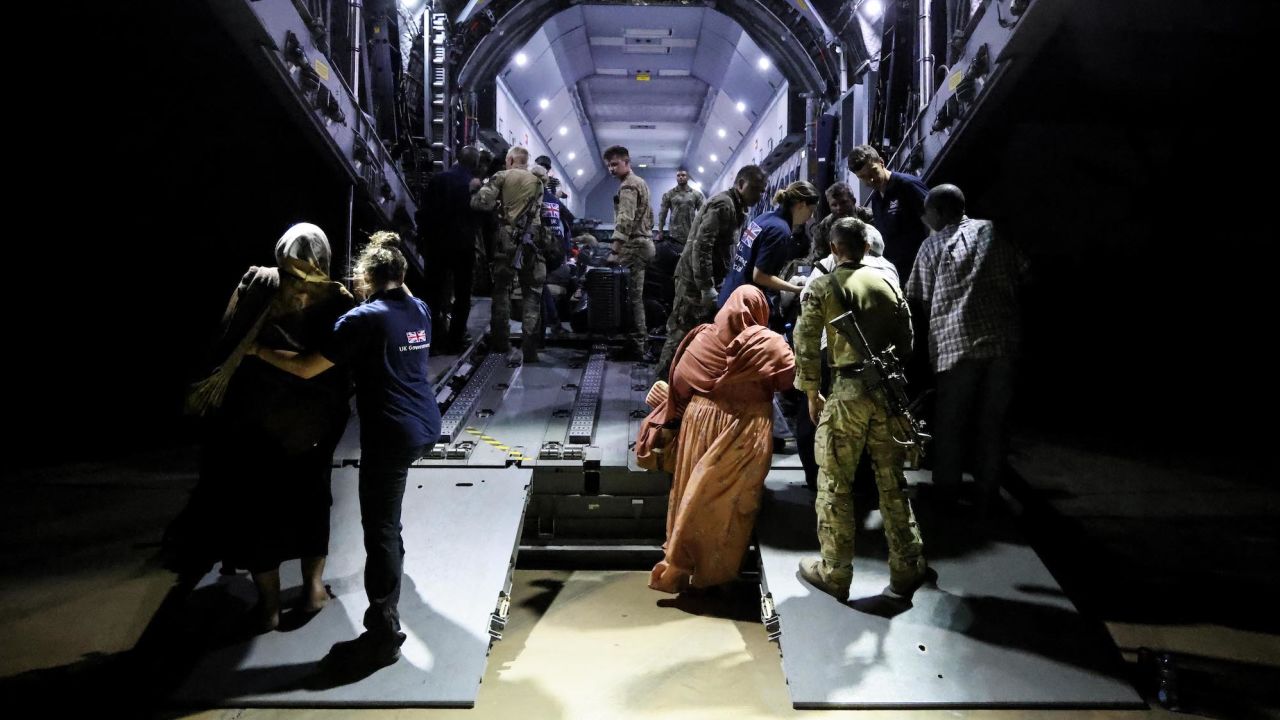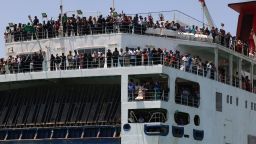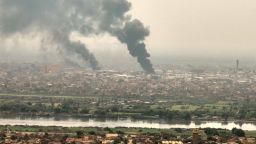begin quote from:
https://www.cnn.com/2023/04/30/world/sudan-crisis-china-uk-uae-evacuations-fighting-unrest-looting-intl-hnk/index.html
Thousands of foreign nationals evacuated amid fighting and looting in Sudan despite truce

Thousands of foreign nationals have been evacuated from Sudan as clashes between two rival military factions vying for control of the country continue despite a supposed truce.
Eyewitnesses across the country reported fighting between the Sudan Armed Forces and the rival Rapid Support Forces on Saturday, including a major battle involving heavy weapons and armed vehicles in the Halfaya neighborhood in Khartoum.
The reports followed the deployment of Sudanese police forces in Khartoum for the first time since the outbreak of the clashes two weeks ago to “maintain security” amid heavy looting.
Khartoum resident Hassan Abdel-Wahhab, 53, told CNN the fighting in Halfaya had taken place for “more than an hour.”
“Until… the exchange of fire stopped after the forces left the neighborhood, no one left their homes,” he said.
Another eyewitness told CNN that Rapid Support Forces had moved in to the Wad Al-Bashir area, west of Omdurman (a major city just northwest of the capital Khartoum).
“Members of the Rapid Support Forces are spreading terror now in Al-Arda Street and Wad Al-Bashir area, firing bullets in the air and looting the citizens who stayed in their homes for fear of these practices,” a female resident from the area told CNN on Saturday under the condition of anonymity for security reasons.
Violent clashes also unfolded in the center of the capital near the presidential palace, eyewitnesses said.
Widespread looting
Earlier on Saturday, Sudanese Police deployed forces for the first time since the beginning of the fighting in Khartoum to “maintain security” amid widespread reports of looting.
Among those deployed were combat-trained police personnel from the Central Reserve Forces.
“We are deploying forces from the Central Reserve Forces in the main streets and markets to maintain security in Khartoum,” Sudan’s Ministry of Interior said in post shared on its official Facebook account.
Residents on the ground have told CNN that markets and shops have been heavily targeted by looters in the past few days.
Hatem Awadallah, a German citizen of Sudanese origin who lives in Khartoum told CNN in a phone call that he had been the victim of looting by members of the Rapid Support Forces (RSF).
“I woke up at 1:30 a.m. to the sound of a Kalashnikov weapon that was placed on my head and a group of armed RSF men… demanding that I give them any amount of money – or I would be killed,” Awadallah said.
He added that his 83-year-old mother and family had also been threatened with guns by thieves who demanded money.
The family ended up surrendering $14,000 while thieves also stole another $5,000 and destroyed two iPhones and an iPad by shooting them.
“They looted a new car – a Toyota truck – and then left the house,” Awadallah said. “Three of our house guards who were tied up, told us that those who looted them came in four armed cars belonging to the RSF,” he said.
Thousands evacuated
The fighting came as countries including the United Kingdom, China and the UAE reported the evacuation of thousands of foreign nationals.
The UK said Saturday that it had evacuated more than 1,888 people on 21 flights since evacuation operations started on Tuesday.
The vast majority of those evacuated were British nationals and their dependents, the British foreign ministry said, adding that the final British flight would depart from the Wadi Saeedna airfield on Saturday.
The ministry had previously said evacuations would end on Saturday “due to declining demand for seats.”
The ministry said it would now focus on “providing consular support to British nationals in Port Sudan and neighboring countries in the region.”
“We continue to press all diplomatic levers to secure a long-term ceasefire and end the bloodshed in Sudan. Ultimately a stable transition to civilian rule is the best way to protect the security and prosperity of the Sudanese people,” said Foreign Secretary James Cleverly.
China, meanwhile, said it had evacuated 940 Chinese citizens and 231 foreign personnel from Sudan to Saudi Arabia between Wednesday and Saturday.
“In order to protect the lives and property of Chinese citizens in Sudan, the Chinese military has been ordered to evacuate Chinese personnel in Sudan,” said Senior Colonel Tan Kefei.
The Chinese People’s Liberation Army (PLA) Navy’s destroyer Nanning and supply ship Weishanhu had evacuated the individuals with the help of Chinese embassies and consulates from Port Sudan to the port of Jeddah, Tan said.
Also on Saturday, a United Arab Emirates evacuation plane arrived in Abu Dhabi from Sudan, according to a statement by the UAE Ministry of Foreign Affairs sent to CNN.
The plane was “carrying Emirati citizens and nationals of 16 countries, including vulnerable groups of the sick, children, elderly and women – who are among the UAE’s top priorities in light of clashes occurring in Sudan since the middle of this month,” the statement said.
“The UAE will host them in the country and provide all necessary services prior to their transfer to their countries.”
The plane is the first UAE evacuation plane since the start of the clashes two weeks ago in Sudan.
News of the evacuations came as the first US-led effort to evacuate private American citizens was completed on Saturday, with a convoy organized by the US government reaching Port Sudan after a long journey from the capital Khartoum.
The effort came amid mounting anger from Americans in Sudan who felt abandoned by the US government, which had maintained for more than a week that conditions were not conducive to a civilian evacuation despite all US government personnel being evacuated in a military operation last weekend.
But while many foreign nationals have now been evacuated, on the ground many Sudanese remain stuck in deteriorating and deadly conditions.
Hundreds have been killed and thousands wounded since the fighting broke out.
Experts say the country is now at risk of a humanitarian disaster, as those still trapped in their homes face shortages of food, water, medicine and electricity.



